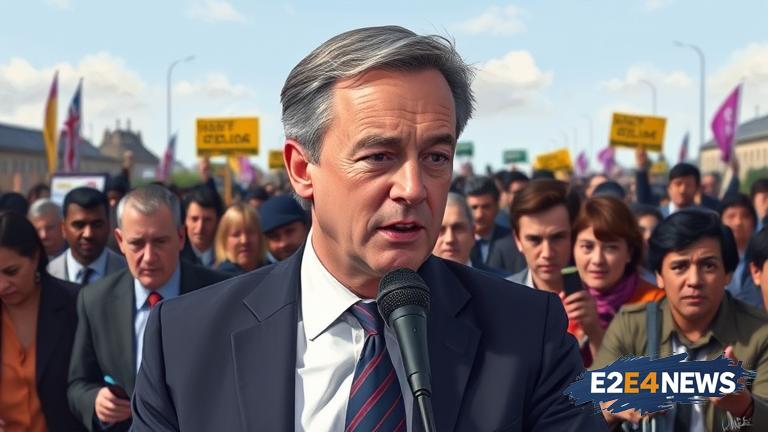Nigel Farage, the leader of the Brexit Party, has outlined a radical plan to deport millions of immigrants from the UK, sparking a heated debate about the country’s immigration policies. The plan, which has been met with widespread criticism, aims to reduce the number of immigrants in the UK by implementing a strict points-based system. According to Farage, the current immigration system is ‘broken’ and in need of a major overhaul. He claims that the UK’s immigration policies have led to a surge in crime, put a strain on public services, and undermined the country’s cultural identity. Farage’s plan would involve the deportation of anyone who has entered the UK illegally, as well as those who have committed crimes or are deemed to be a threat to national security. The plan has been condemned by human rights groups, who argue that it would lead to the separation of families and the deportation of people who have made significant contributions to British society. Critics also argue that the plan is unworkable and would be extremely costly to implement. The UK’s immigration system has been a major point of contention in recent years, with many arguing that it is too lenient and allows too many people to enter the country. However, others argue that immigration has been a key driver of economic growth and has helped to fill labor shortages in key sectors. The debate over immigration is likely to continue in the coming months, with Farage’s plan likely to be a major talking point. The plan has also sparked a debate about the role of the UK’s borders and how they should be managed. Some argue that the UK should have a more open borders policy, while others believe that the country should prioritize the needs of its own citizens. The issue of immigration is complex and multifaceted, and there are no easy solutions. However, it is clear that the UK’s immigration system is in need of reform and that a more nuanced approach is needed. Farage’s plan may be a starting point for this debate, but it is unlikely to be the final solution. The plan has also raised questions about the UK’s relationship with the EU and how it will manage its borders post-Brexit. The UK’s decision to leave the EU has created uncertainty about the future of immigration in the country. The government has promised to introduce a new points-based system, but the details of this system are still unclear. The plan has also sparked a debate about the role of the media in shaping public opinion on immigration. Some argue that the media has been too quick to demonize immigrants and has helped to create a toxic atmosphere around the issue. Others argue that the media has a responsibility to report on the facts and to provide a balanced view of the debate. The issue of immigration is likely to continue to be a major talking point in the coming months, and it will be interesting to see how the debate unfolds. The plan has also raised questions about the UK’s human rights record and how it will balance the need to control its borders with the need to protect the rights of immigrants. The UK has a long history of providing a safe haven for refugees and asylum seekers, and it will be interesting to see how this tradition is maintained in the future. The plan has also sparked a debate about the role of politics in shaping public opinion on immigration. Some argue that politicians have been too quick to use immigration as a wedge issue, and that this has helped to create a divisive atmosphere around the issue. Others argue that politicians have a responsibility to listen to the concerns of their constituents and to develop policies that reflect their views. The issue of immigration is complex and multifaceted, and it will require a nuanced and thoughtful approach to resolve. The plan has also raised questions about the UK’s economic future and how it will be affected by changes to the immigration system. The UK’s economy has been driven in part by immigration, and it will be interesting to see how changes to the system will impact on the country’s economic growth. The plan has also sparked a debate about the role of education in shaping public opinion on immigration. Some argue that education is key to promoting a more nuanced understanding of the issue, and that it can help to break down stereotypes and prejudices. Others argue that education is not enough, and that a more fundamental shift in public attitudes is needed. The issue of immigration is likely to continue to be a major talking point in the coming months, and it will be interesting to see how the debate unfolds.
